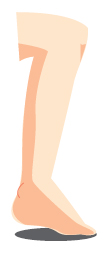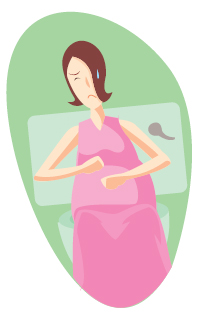You will face a series of physical and other changes throughout your pregnancy. They will occur progressively, giving you ample time to prepare for, and adjust to, them. Here’s an idea of what you can expect.
Physical Changes
Digestive System
What’s going on?
As you progress into your pregnancy, your uterus enlarges to accommodate your growing baby, and your abdomen follows through.Your uterus will rise from your pubic area in early pregnancy and reach the bottom of your rib cage late in the pregnancy. During its enlargement, other organs such as the bladder, kidneys, diaphragm and intestines will be pressed and their functions affected. Near the end of your pregnancy, your abdomen will sag lower and you will feel your baby settling down in your pelvis. These events, coupled with changes in your hormonal levels, often bring about morning sickness and constipation.
What you can do
MORNING SICKNESS. Feeling nauseated is often an early sign of pregnancy. It can start from the 5th week and last till about the 15th week. However, there is a small possibility that it will come back later. ‘Morning sickness’ can happen at any time of the day, but most women find that there is a particular time of day when this happens. Smells of certain types of food or cigarette smoke can cause nausea, and tiredness can make it worse. To counteract nausea, try eating a couple of plain biscuits before getting out of bed. Avoid foods and smells that make you sick, and have small, frequent meals throughout the day. Drinking an infusion of ginger or chamomile tea can be helpful.

CONSTIPATION. Constipation will occur normally, from early pregnancy till the 6th month. This is because during pregnancy, the hormone progesterone relaxes the muscles of the intestine, and slows down bowel movements, thus making you more likely to be constipated.You will experience passing hard, dry stools and at less frequent intervals than usual. It is advised that you consume plenty of high-fibre foods and drink lots of water. Exercise regularly. Go to the toilet whenever you need to and see your doctor if this matter persists. Intake of chamomile, fennel, and ginger herbal supplements may also help.
Worried About Small Breasts?
The size of your breasts does not determine how successful you will be in breastfeeding your baby. Larger breasts do not mean more breast milk, as they only contain more fat. Thus, small breasted women are just as capable of producing breast milk and nursing their babies as other women.

Breasts
What’s going on?
As early as the 2nd week after conception, your breasts and nipples may start to enlarge. The milk producing glands increase in size due to the high levels of estrogen and progesterone hormones produced in your body. The enlargement of breasts is partly due to fat gained during pregnancy, and they weigh about 0.45 kg to 1.36 kg of your total body weight. The tiny bumps on the areolae will also start enlarging to moisturize and soften the skin. At the 16th week of pregnancy, your areolae will grow larger and darker due to greater blood circulation and increased pigmentation. Blood vessels in your skin may also become engorged and more visible during pregnancy and your nipples may start to leak colostrum nearing delivery.Your breasts become fuller and heavier due to the change of hormone levels in the body. They also feel more tender and sensitive throughout pregnancy.
What you can do
In order to give comfort to your breasts during pregnancy, you are advised to choose a bra with a deep band under the cups, and broad shoulder straps with an adjustable back. Constantly check the size of your breasts, as they continue to swell throughout pregnancy. When your breasts become very heavy, wear a lightweight bra at night.
Swelling & Water Retention
What’s going on?
Nearing the 3rd trimester of your pregnancy, you may observe swelling at your feet and ankles.Your body tissues tend to hold more water and this particularly affects the lower parts of your body. The situation worsens if you stand for long hours or are exposed to hot weather. It is also common for your fingers to get stiff and swell, especially in the morning.
What you can do
You can lessen the swelling by elevating your feet whenever possible, especially at the end of the day. Try gentle foot exercises as well. Do not limit fluids during these times as the less fluid you consume, the more likely it is for your body to retain them. Consult your doctor if you notice more marked swelling as this could be a sign of pre-eclampsia.
Rashes
What’s going on?
Pregnant women might develop rashes beneath their breasts or in the groin. This is particularly common in warm humid weather, and is caused by the irritating effect of perspiration on rubbing skin surfaces.
What you can do
You should wash and dry these areas often, and soothe the skin with calamine lotion or plain cornstarch. It is advisable to wear loose cotton clothing.
Increased Pigmentation
What’s going on?
Pregnant women might develop ‘stretch marks’ in the skin of the abdomen, breasts or thighs. The marks will appear as pinkish to reddish, slightly indented lines and are caused by the stimulation of the pigmentation producing cells, as a result of the higher levels of estrogen and progesterone in the body.You might also experience a dark line that goes from the navel to the pubic hair in the centre of the abdomen.
Dark brown pigmentation, commonly known as the ‘mask of pregnancy’, might also appear on the face – mostly on nose, cheeks and forehead – and neck. These changes will normally disappear or fade after pregnancy. It is important to note that they are not dangerous or suggestive of illness.
What you can do
STRETCH MARKS. There is nothing you can do, as the hormone change in your body is a natural process. These marks should disappear or change to a lighter tone once you give birth to your baby.
MASK OF PREGNANCY.
As this condition is likely to occur with sun exposure, it is advised that you use sunscreen when you go out, especially during the second half of pregnancy when pigmentation becomes more apparent.
Bladder
What’s going on?
When your baby moves deeper into the pelvis and presses on your bladder, you will experience frequent urination. The progesterone hormone in your body will relax the muscles of your ureters, slowing the flow of urine. The increasing size of your uterus further slows the flow of urine through your kidneys and bladders, heightening the risks of bladder and kidney infections.
What you can do
Consult your doctor if any symptom of infection shows up.
Emotional changes
If this is your first time being pregnant, you will be surprised by all the mood changes you’ll experience.Your emotions can range from being delighted and excited one day, to turning depressed or disappointed the next.
Due to getting pregnant
Some women may regret becoming pregnant, and are depressed over this matter. This situation happens when they are not ready for commitment or have had miscarriages before. If you are unhappy about being pregnant, share your feelings with your spouse and family members.You should consult your doctor for advice on this matter.
Due to hormonal changes
The hormonal changes in your body is a vital factor for mood swings. Fluctuating levels of estrogen, progesterone and other similar hormones in your body can cause “blues” during menstruation, pregnancy and menopause. This is also one of the reasons for postnatal depression. There is nothing you can do to change the hormone levels in your body. Get more rest and discuss your feelings with your spouse; it might make you feel better. If the feelings persist, consult your doctor who may need to refer you to a counsellor or psychiatrist.
Due to changes in pregnancy
Emotional stress due to the changes in your body is frequent and common. Changes in energy levels, bowel habits and the bladder may lead you to think that you are having illnesses or other health problems.You should not worry, as these changes are normal in pregnant women. Get more rest when you feel exhausted and worn out during these changes. It is important to rely on your partner, family members and friends for emotional support while having to deal with these changes.
Due to worry
It is common for mothers to want the best for their babies. This is why pregnant women are often anxious in assuming their role as mothers when their babies are born. They are worried about ‘not knowing enough’ and nervous on whether they would be able to handle their babies appropriately.Your worries are unnecessary, as you will learn the appropriate handling manners as you go along with your baby. It is important to note that there are no definite methods on how to handle your baby.
Due to your appearance
During the 1st trimester, you may worry about how the extra pounds will look on you. However, your emotions will be more affected during the 2nd trimester when you gain more weight. You might not like the way you look, or feel unattractive to your partner and this can cause you to feel frustrated and disappointed in yourself. Discuss your thoughts and feelings with your spouse so that he will be able to give you confidence and support you emotionally.






Comments